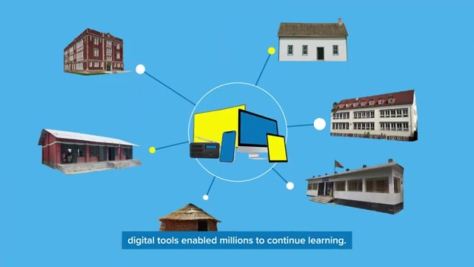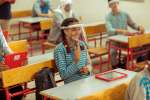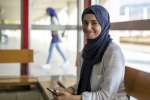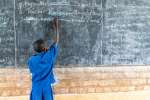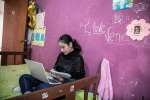Refugee Connected Education Challenge
Refugee-hosting schools are simply not equipped with the digital resources, skills, and knowledge needed to foster learners who can succeed in an increasingly digital world.
With long term or frequent school closures due to COVID-19, along with the ever-changing landscape of crises being faced by refugees around the world, it is critical we accelerate efforts to ensure refugee-hosting schools and classrooms are not left further behind.
The time to act is now.
UNHCR needs you to act now. We call on society’s stakeholders, governments, private sector and partners to commit to the Refugee Connected Education Challenge and close the digital divide faced by displaced learners. Join us by becoming a sponsor, investing in Connected Education for refugees, and helping to advocate for greater refugee inclusion.

We need to ensure that schools that host refugees, and forcibly displaced students, are prioritized and meaningfully included in global and national digital education and connectivity efforts.
Only then will we be able to achieve SDG4 and provide more equitable futures for refugee children and youth around the globe.
© UNHCR/Catherine Wachlaya. Students are excited to use tablets from the Instant Network Schools (INS) kits available at a community centre.
In 2021, education actors worldwide are mobilizing to strengthen education systems to counteract future school closures and address the effects of learning loss experienced during the pandemic. As actors around the globe prepare to make public declarations on school connectivity and craft national connected education investment plans, it is imperative that schools and communities that host refugees and displaced learners are included within pilots and development rollouts.
Our goal is to ensure refugee-hosting schools and communities are meaningfully included within all global and national connectivity and digital learning programmes planned between now and 2030.
Read The Report
Read the Report
UNHCR released the Connected Education For Refugees: Addressing the Digital Divide report that provides an overview of the current status and challenges faced by refugees in accessing digital learning opportunities during the COVID-19 pandemic.
The report notes that 78 per cent of refugee children and youth had limited to no access to learning opportunities during pandemic related school closures.
The report also highlights the additional measures taken to extend access to refugee-hosting communities, putting forward recommendations on how to better design for more inclusive digital learning programmes that can benefit all learners.
Challenge Sponsors
We are looking to identify a group of Challenge sponsors to support this initiative. Sponsors will help demonstrate the type of clear and concrete commitments needed to ensure meaningful and safe inclusion of displaced learners within digital learning and school connectivity initiatives while also mobilizing their networks to secure further commitments and actors in the run-up of the next Global Refugee Forum in 2023.
Challenge sponsors need to commit to:
- articulate support to achieve the aims of the Challenge;
- make a clear and measurable commitment to ensuring the digital inclusion of displaced learners and their host communities in digital learning and connectivity initiatives;
- promote the Challenge, and mobilize further commitments across your networks;
- participate in the Challenge Action Group:
- this will include biannual meetings to track progress against the Challenge commitments;
- submissions of contributions to the annual Challenge report;
- and supporting the identification of the next steps for the Challenge.
Additional co-sponsors and commitments will be secured in the run-up to the next Global Refugee Forum in 2023, building from the momentum of the Challenge launch.
Example Commitments
Aligned with the spirit of the Global Compact on Refugees, the commitments can include a mixture of financial, technical and in-kind. For example:
- Government and donors contributing to digital learning initiatives could commit to earmarking X% of their support for the inclusion of refugee-hosting schools and institutions.
- Host governments commit to including at least X% of schools hosting refugees or displaced learners in each phase of their connectivity and digital education rollouts.
- Technology companies commit that X% of all in-kind hardware donations go to support refugee-hosting schools or displaced scholars.
- Mobile Network Operators commit to connecting X number of schools hosting refugees or displaced learners.
- Partners provide critical funding to enable school connectivity for refugees to be scaled up and sustained.
Challenge Launch
This challenge was proudly launched in December 2021 alongside the Global Refugee Forum High-Level Officials Meeting and the RewirED Summit.

It coincides with other commitments, including the Global Declaration on Connectivity for Education, providing the opportunity for actors to further reinforce their commitment to digital inclusion by specifying how they plan to meaningfully and safely include displaced populations within their ongoing digital learning programming.
© UNHCR/Assadullah Nasrullah. Kenya. Juba primary school.
Submit your commitment
If you would like to announce a Challenge Commitment, please submit your pledge using the form and process outlined here.
Join Us
If you’d like to be a Challenge Sponsor, please confirm your interest by contacting [email protected].
-
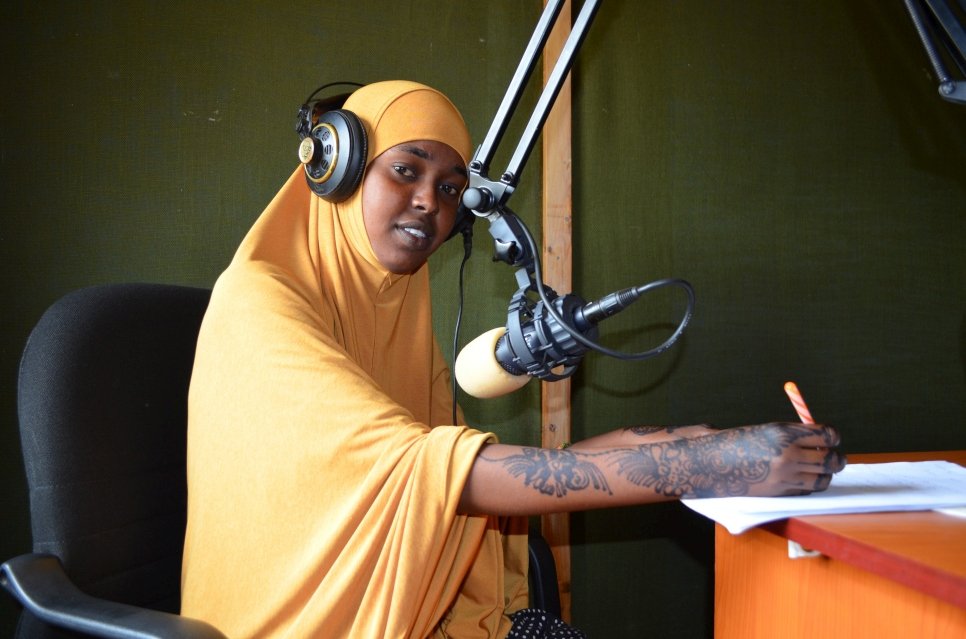 Kenya. Dadaab Refugee Camps, UNHCR- International Rescue Committee (IRC)-hospital. Kowsar is working as an intern at Radio Gargaar, a camp based radio program for the Dadaab refugee community. Before joining the team of reporters, Kowsar studied journalism at a vocational training centre managed by the Norwegian Refugee Council for UNHCR. © UNHCR/Silja Ostermann
Kenya. Dadaab Refugee Camps, UNHCR- International Rescue Committee (IRC)-hospital. Kowsar is working as an intern at Radio Gargaar, a camp based radio program for the Dadaab refugee community. Before joining the team of reporters, Kowsar studied journalism at a vocational training centre managed by the Norwegian Refugee Council for UNHCR. © UNHCR/Silja Ostermann -
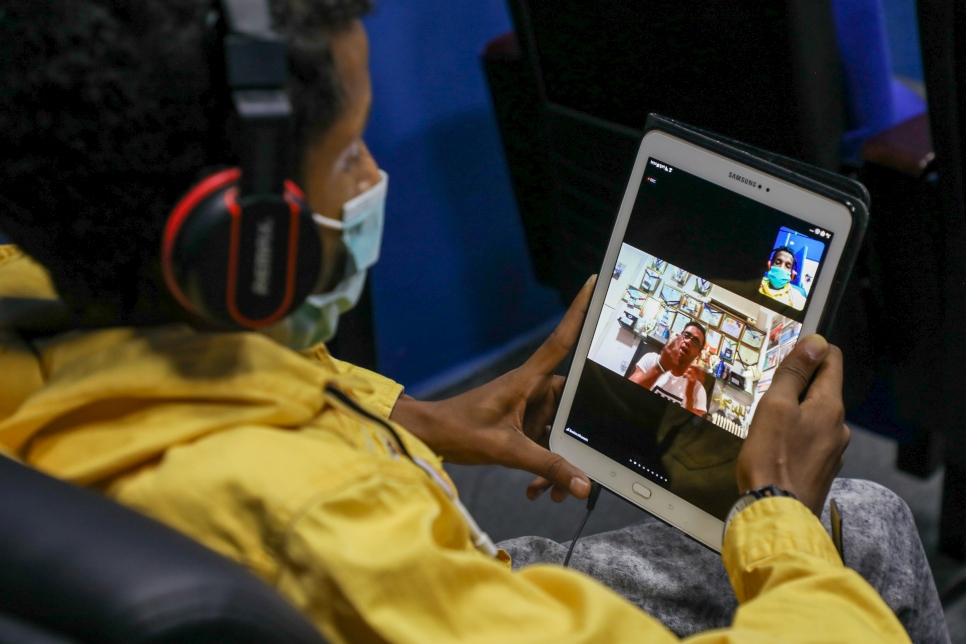 Jordan. Wessam, 12, a Syrian refugee, listens to refugee Paralympic athlete Ibrahim AlHussein tell his story. © UNHCR/Lilly Carlisle
Jordan. Wessam, 12, a Syrian refugee, listens to refugee Paralympic athlete Ibrahim AlHussein tell his story. © UNHCR/Lilly Carlisle -
 Mozambique. Instant Network School opens in Maratane Refugee Settlement. Amosi, fled conflict in the DRC with only his younger brother: "We are able to go to school. We like studying." © UNHCR/Vodafone Foundation/Sala Lewis
Mozambique. Instant Network School opens in Maratane Refugee Settlement. Amosi, fled conflict in the DRC with only his younger brother: "We are able to go to school. We like studying." © UNHCR/Vodafone Foundation/Sala Lewis -
 Egypt. INS (Instant Network Schools) student, Malak, reacts to a virtual visit from Liverpool striker Mohamed Salah. Laughs, cries and giggles filled the classroom as a big TV screen flashed on and suddenly Salah appeared to share his views on the benefits of digital learning. Students' faces lit up as he called out their name and talked to each one. © UNHCR/Ezz Elmasry
Egypt. INS (Instant Network Schools) student, Malak, reacts to a virtual visit from Liverpool striker Mohamed Salah. Laughs, cries and giggles filled the classroom as a big TV screen flashed on and suddenly Salah appeared to share his views on the benefits of digital learning. Students' faces lit up as he called out their name and talked to each one. © UNHCR/Ezz Elmasry -
 Weam, 19 years old, is a first-year student in Computer Science at Lebanese University (UL), on a DAFI scholarship. She comes from Dara'a, Syria and arrived in Lebanon in 2015. © UNHCR/Antoine Tardy
Weam, 19 years old, is a first-year student in Computer Science at Lebanese University (UL), on a DAFI scholarship. She comes from Dara'a, Syria and arrived in Lebanon in 2015. © UNHCR/Antoine Tardy -
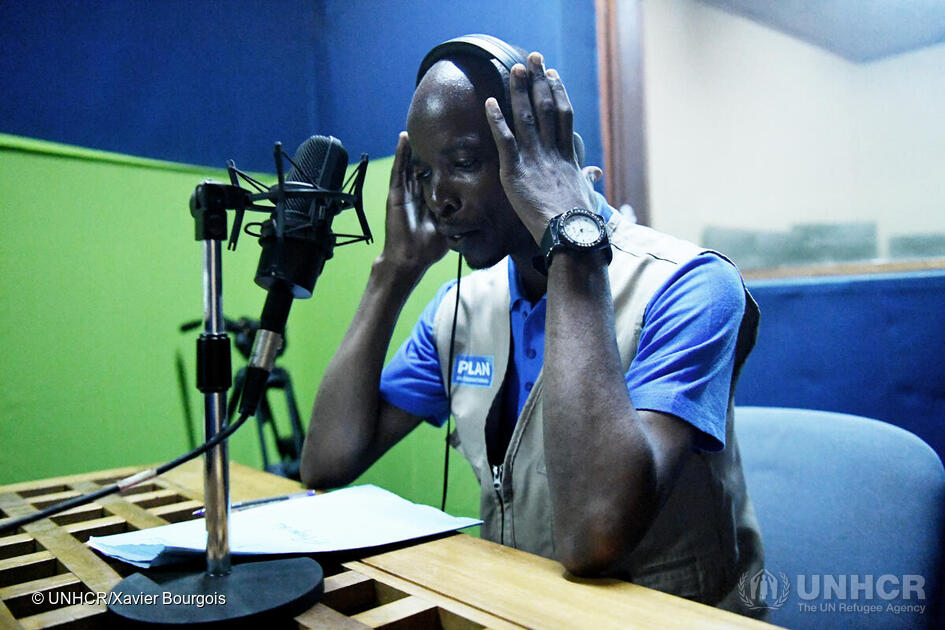 Cameroon. Igor, one of the refugee reporters involved in the creation of a new refugee radio show, is recording the first show at CIRTEF editing studio. © UNHCR/Xavier Bourgois
Cameroon. Igor, one of the refugee reporters involved in the creation of a new refugee radio show, is recording the first show at CIRTEF editing studio. © UNHCR/Xavier Bourgois -
 Rwanda. Primary school students in Mugombwa refugee camp, return to the classroom after extensive school closures due to COVID-19. © UNHCR/Eugene Sibomana
Rwanda. Primary school students in Mugombwa refugee camp, return to the classroom after extensive school closures due to COVID-19. © UNHCR/Eugene Sibomana -
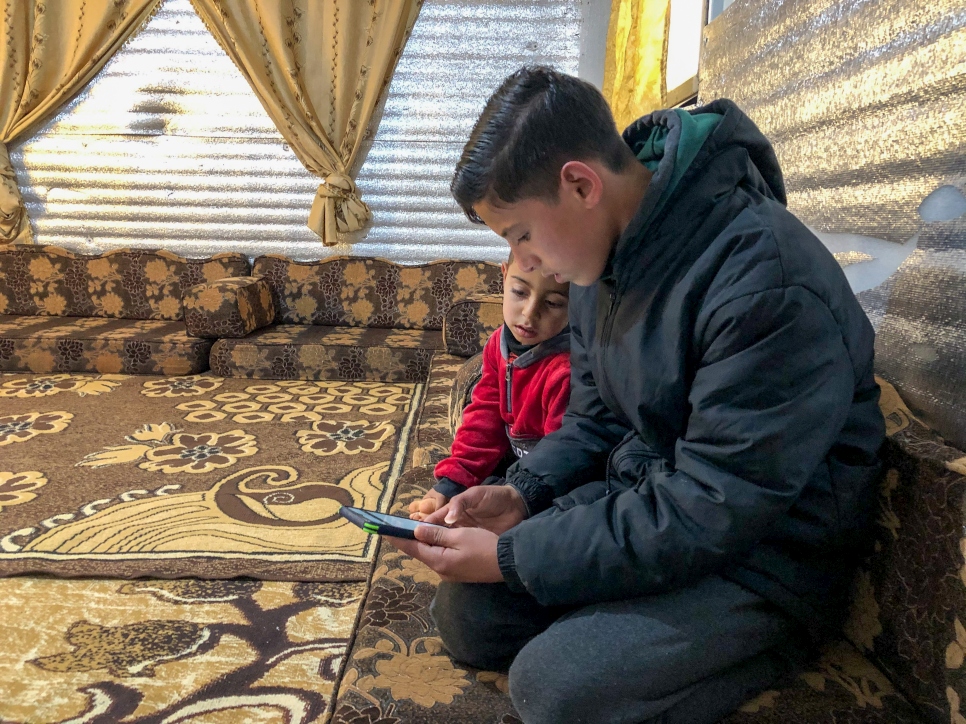 Jordan. Refugee students study from home in Azraq Refugee Camp. Mousa AlMousa, 14, and his younger brother study on his phone via the UNHCR supported Kolibri platform. © UNHCR/Hamzeh Al Moumani
Jordan. Refugee students study from home in Azraq Refugee Camp. Mousa AlMousa, 14, and his younger brother study on his phone via the UNHCR supported Kolibri platform. © UNHCR/Hamzeh Al Moumani -
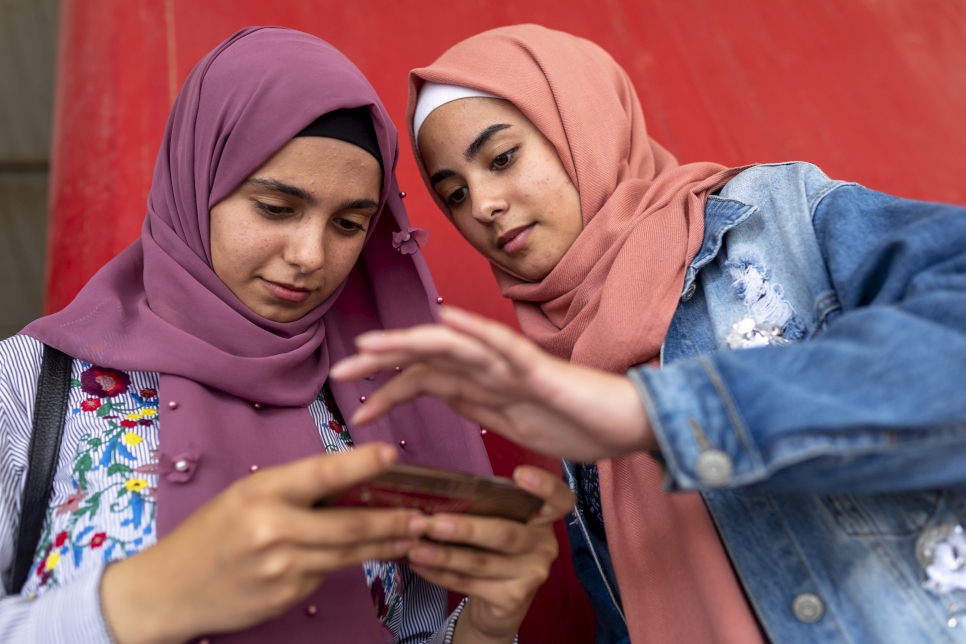 Lebanon. DAFI students play video games on campus in Beirut. Weam (left), 19 years old, is a student in Computer Science (first year) at Lebanese University (UL). She is from Dara'a, Syria and arrived in Lebanon in 2015. On the right is Weam's friend, Diala, a first-year Biology student. © UNHCR/Antoine Tardy
Lebanon. DAFI students play video games on campus in Beirut. Weam (left), 19 years old, is a student in Computer Science (first year) at Lebanese University (UL). She is from Dara'a, Syria and arrived in Lebanon in 2015. On the right is Weam's friend, Diala, a first-year Biology student. © UNHCR/Antoine Tardy -
 Venezuela refugee Yvana Portillo, 15, studies in her bedroom at home in Lima, Peru. Now aged 15, she fled Venezuela with her family in 2017. Now living in the Peruvian capital Lima, she has thrived in her new surroundings and is top of her class in high school, emerging as an advocate for accessible, quality education. © UNHCR/Sebastian Castañeda
Venezuela refugee Yvana Portillo, 15, studies in her bedroom at home in Lima, Peru. Now aged 15, she fled Venezuela with her family in 2017. Now living in the Peruvian capital Lima, she has thrived in her new surroundings and is top of her class in high school, emerging as an advocate for accessible, quality education. © UNHCR/Sebastian Castañeda -
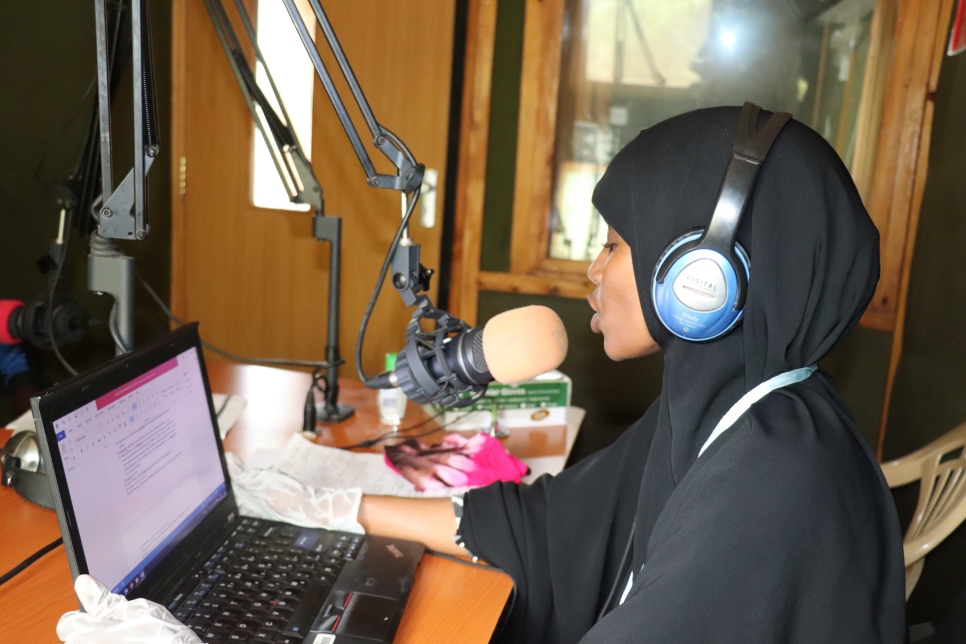 Somali refugee teacher, Amina Hassan, gives an English lesson to grade five pupils over the radio system at Dadaab camp in Kenya. © UNHCR/Jimale Abdullahi
Somali refugee teacher, Amina Hassan, gives an English lesson to grade five pupils over the radio system at Dadaab camp in Kenya. © UNHCR/Jimale Abdullahi -
 Twelve-year-olds, Sahag and Salpie*, are twins from Syria whose family have sought protection in Armenia. The siblings are taking Zoom classes on a computer lent to them by their teacher, after their school in Yerevan was closed because of coronavirus prevention measures. © UNHCR/Anahit Hayrapetyan
Twelve-year-olds, Sahag and Salpie*, are twins from Syria whose family have sought protection in Armenia. The siblings are taking Zoom classes on a computer lent to them by their teacher, after their school in Yerevan was closed because of coronavirus prevention measures. © UNHCR/Anahit Hayrapetyan -
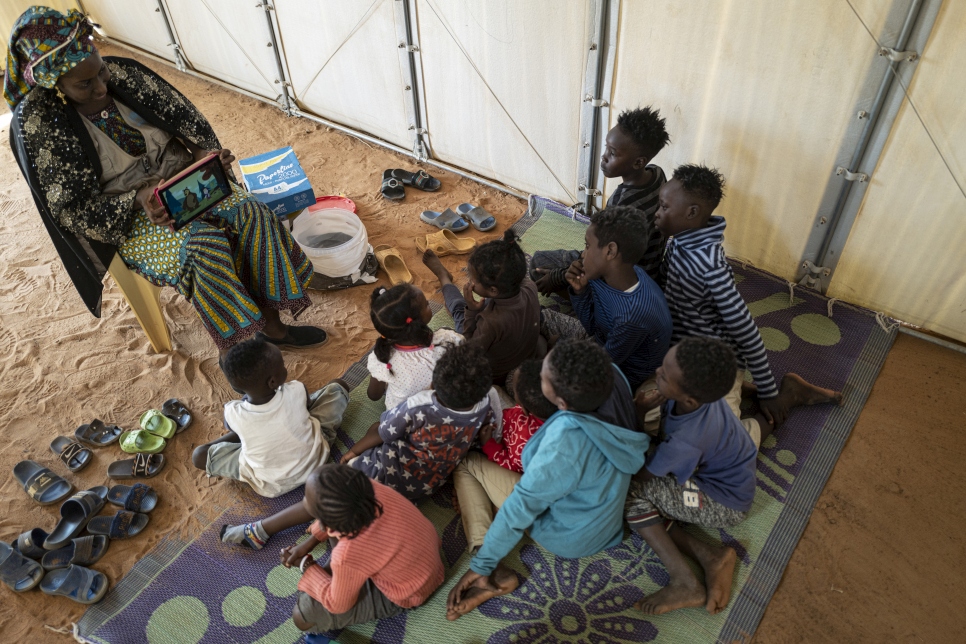 Refugee children watch a video to help them learn French at the Emergency Transit Mechanism in Hamdallaye, near the Nigerien capital Niamey. Language skills will be useful in finding durable solutions for them. © UNHCR/Sylvain Cherkaoui
Refugee children watch a video to help them learn French at the Emergency Transit Mechanism in Hamdallaye, near the Nigerien capital Niamey. Language skills will be useful in finding durable solutions for them. © UNHCR/Sylvain Cherkaoui

